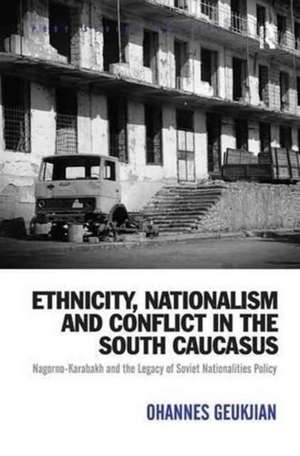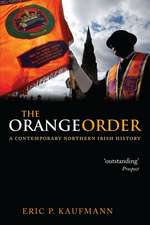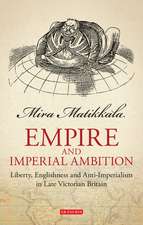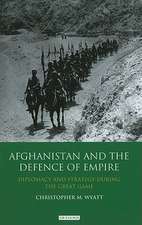Ethnicity, Nationalism and Conflict in the South Caucasus: Nagorno-Karabakh and the Legacy of Soviet Nationalities Policy: Post-Soviet Politics
Autor Ohannes Geukjianen Limba Engleză Paperback – 17 noi 2016
| Toate formatele și edițiile | Preț | Express |
|---|---|---|
| Paperback (1) | 489.26 lei 6-8 săpt. | |
| Taylor & Francis – 17 noi 2016 | 489.26 lei 6-8 săpt. | |
| Hardback (1) | 823.44 lei 6-8 săpt. | |
| Taylor & Francis – 28 dec 2011 | 823.44 lei 6-8 săpt. |
Din seria Post-Soviet Politics
-
 Preț: 355.98 lei
Preț: 355.98 lei - 25%
 Preț: 324.16 lei
Preț: 324.16 lei - 28%
 Preț: 739.39 lei
Preț: 739.39 lei -
 Preț: 465.91 lei
Preț: 465.91 lei - 18%
 Preț: 1005.46 lei
Preț: 1005.46 lei - 15%
 Preț: 669.94 lei
Preț: 669.94 lei -
 Preț: 376.37 lei
Preț: 376.37 lei - 18%
 Preț: 1114.70 lei
Preț: 1114.70 lei - 19%
 Preț: 247.40 lei
Preț: 247.40 lei - 15%
 Preț: 705.53 lei
Preț: 705.53 lei - 19%
 Preț: 259.07 lei
Preț: 259.07 lei - 16%
 Preț: 242.71 lei
Preț: 242.71 lei - 30%
 Preț: 769.00 lei
Preț: 769.00 lei - 31%
 Preț: 766.57 lei
Preț: 766.57 lei - 18%
 Preț: 1002.63 lei
Preț: 1002.63 lei - 15%
 Preț: 259.51 lei
Preț: 259.51 lei -
 Preț: 382.75 lei
Preț: 382.75 lei -
 Preț: 381.81 lei
Preț: 381.81 lei -
 Preț: 386.39 lei
Preț: 386.39 lei -
 Preț: 319.91 lei
Preț: 319.91 lei -
 Preț: 385.62 lei
Preț: 385.62 lei -
 Preț: 387.91 lei
Preț: 387.91 lei -
 Preț: 388.26 lei
Preț: 388.26 lei -
 Preț: 385.71 lei
Preț: 385.71 lei - 17%
 Preț: 272.50 lei
Preț: 272.50 lei - 18%
 Preț: 1005.17 lei
Preț: 1005.17 lei - 18%
 Preț: 1007.48 lei
Preț: 1007.48 lei - 18%
 Preț: 1053.33 lei
Preț: 1053.33 lei - 28%
 Preț: 496.94 lei
Preț: 496.94 lei
Preț: 489.26 lei
Nou
Puncte Express: 734
Preț estimativ în valută:
93.65€ • 101.76$ • 78.72£
93.65€ • 101.76$ • 78.72£
Carte tipărită la comandă
Livrare economică 21 aprilie-05 mai
Preluare comenzi: 021 569.72.76
Specificații
ISBN-13: 9781138279032
ISBN-10: 113827903X
Pagini: 264
Dimensiuni: 156 x 234 mm
Greutate: 0.45 kg
Ediția:1
Editura: Taylor & Francis
Colecția Routledge
Seria Post-Soviet Politics
Locul publicării:Oxford, United Kingdom
ISBN-10: 113827903X
Pagini: 264
Dimensiuni: 156 x 234 mm
Greutate: 0.45 kg
Ediția:1
Editura: Taylor & Francis
Colecția Routledge
Seria Post-Soviet Politics
Locul publicării:Oxford, United Kingdom
Notă biografică
Ohannes Geukjian is an Assistant Professor at the American University of Beirut, Lebanon.
Recenzii
'Ohannes Geukjian expertly analyzes the history and development of the conflict, presenting both the Armenian and Azerbaijani perspectives, and highlighting the Gorbachev era as the major factor precipitating open warfare between the two national groups.' Robert O. Freedman, Johns Hopkins University, USA 'Geukjian highlights the complexity and historical nature of the relationship between Armenia and Azerbaijan. By examining the various actors, from Russia, Persia, Turkey and Europe, Geukjian explores how this relationship has been pushed and pulled, with a particular emphasis on the Soviet nationalities policy. The genealogy provides an extended view of the region economically, politically and geographically like a time-lapse film that conveys continual change, emphasising that neither party is completely innocent. The book is essential reading for anyone with an interest in the South Caucasus region, and for scholars working on ethnicity and nationalism.' Europe-Asia Studies 'For those who do not know the story of this conflict, the book serves as a useful primer.' Slavic Review 'The book is well written and I recommend it to anyone who is interested not only in the history of Nagorno-Karabakh, but also in how ethnicity and nationalism shape conflict.' Political Studies Review
Cuprins
Chapter 1 Introduction, Methodology and Structure; Chapter 2 The Ethnic Past and Myths of Ethnogenesis in Transcaucasia; Chapter 3 The Origins of the Conflict in the Later Russian Empire; Chapter 4 The Impact of Soviet Structures and Policies; Chapter 5 The Impact of the Soviet Nationalities Policy and the Emergence of Dissident Nationalism in Transcaucasia; Chapter 6 Ethnic Mobilization and the Emergence of the Karabakh Movement (1985-9); Chapter 7 From Escalation to Open Warfare (1991-4); Chapter 101 Epilogue;
Descriere
This book examines the underlying factors of the Nagorno-Karabakh conflict in the South Caucasus from 1905 to 1994, and explores the ways in which issues of ethnicity and nationalism contributed to that conflict. The author examines the historiography and politics of the conflict, and the historical, territorial and ethnic dimensions which contributed to the dynamics of the war.
















